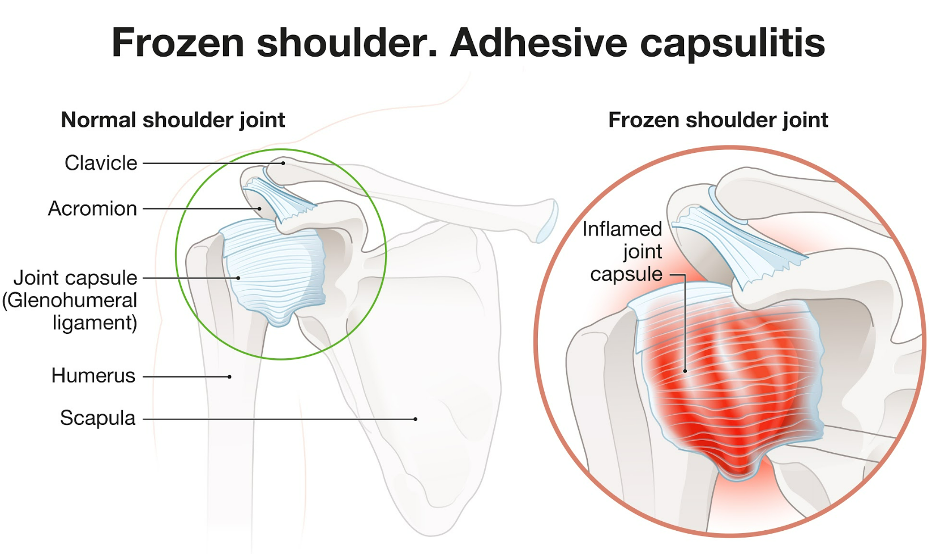
Alleviating Frozen Shoulder in Diabetic Patients
In the bustling city-state of Singapore, where the focus on health and wellness is continually growing, diabetes remains a significant concern, affecting a large number of people. An often-overlooked complication associated with diabetes is the ailment known as frozen shoulder. As individuals cope with the various challenges that diabetes presents, frozen shoulders add an additional layer of pain and physical limitation.
Before we explore the link between diabetes and frozen shoulder, as well as the role that physiotherapy plays in managing this condition, it’s crucial to emphasise that prior consultation with a medical doctor is essential for an accurate diagnosis and appropriate treatment plan. Physiotherapy is a supplementary treatment and should be undertaken only after receiving medical advice.
 Understanding Frozen Shoulder and Its Symptoms
Understanding Frozen Shoulder and Its Symptoms
Frozen shoulder, clinically known as adhesive capsulitis, is a condition that can cause significant disruption to your daily life, characterised primarily by a sustained period of discomfort and reduced mobility in the shoulder joint. Let’s look into each symptom and stage in greater detail:
- Dull Pain in Shoulder and Surrounding Muscles: One of the most striking symptoms is a dull, aching pain in the shoulder area that may extend to the muscles wrapping around the top of your arm. The pain typically intensifies during the night, possibly affecting your ability to sleep well.
- Reduced Range of Motion: The rigidity of the shoulder capsule makes moving the shoulder an arduous task. Simple activities like reaching overhead or behind you become increasingly challenging as the condition progresses.
The condition generally unfolds over a prolonged period, often taking two to three years for complete resolution. The condition has been categorised into three distinct stages, each with its specific characteristics and likely duration:
Stage 1: Freezing
During the initial ‘Freezing’ phase, which can last anywhere between six weeks to nine months, pain is the most salient feature. The pain can increase with any shoulder movement, limiting your shoulder’s functionality significantly. In this stage, the emphasis is usually on pain management and slowing down the progression of stiffness.
Stage 2: Frozen
In the subsequent ‘Frozen’ stage, lasting between four to six months, the pain may decrease. However, this relief is accompanied by enduring stiffness and a restricted range of motion. Here, the main focus shifts from pain management to improving the limited mobility experienced, though both can be simultaneously managed.
Stage 3: Thawing
Lastly, in the ‘Thawing’ stage, which can last from six months up to two years, the symptoms gradually begin to alleviate. Pain is at its lowest compared to the earlier stages, and your shoulder starts regaining its mobility. Yet, intermittent episodes of pain may recur during this phase, though less severe and less frequent.
Understanding these stages and symptoms is key to managing frozen shoulder effectively, especially when considering the extended duration of the condition. Consult healthcare providers for proper diagnosis and an appropriate treatment plan that could involve physiotherapy, medication, or surgical options if the condition doesn’t improve with conservative measures.
The Relationship Between Diabetes and Frozen Shoulder
Studies suggest a compelling connection between diabetes and frozen shoulders. Biological processes such as glycosylation contribute to this connection. When there’s too much sugar in the bloodstream, these excess sugar molecules bind to the collagen within the shoulder joint, making the joint stiff and more susceptible to frozen shoulder. This makes blood sugar management an integral part of treating and potentially preventing this condition.
Further complicating the issue, diabetes often results in other musculoskeletal problems that could mimic or exacerbate the symptoms of frozen shoulder. Therefore, careful diagnosis is essential, and physiotherapy must be adapted to each individual’s unique medical profile.
How Physiotherapy Might Provide Relief
If you’re in Singapore and suffering from a frozen shoulder, there are numerous physiotherapy clinics offering specialised treatment. An initial comprehensive assessment, which may include physical examinations, patient history reviews, and possibly imaging tests like X-rays or MRIs, is the first step. Based on this diagnostic information, a personalised treatment plan is then formulated:
- Exercise: Customised exercises aim to incrementally improve the shoulder’s range of motion. Physiotherapists guide you meticulously through these exercises to ensure correct technique and maximal benefit.
- Deep Tissue Massages: These massages aim to alleviate muscle stiffness and encourage better blood flow to the shoulder area. They are particularly beneficial during the frozen stage of the condition.
- Anti-inflammatory Medications: While physiotherapy focuses on physical treatments, medication for pain and inflammation may sometimes be prescribed. These medications often complement the physical treatments, making the entire process more bearable.
You Don’t Have to Shoulder the Pain Alone
Living with both diabetes and frozen shoulders is undoubtedly challenging, but you don’t have to go through it alone. Specialised physiotherapy offers customised treatment options tailored to your unique health needs. Physiotherapy isn’t solely about physical exercise; it embodies a comprehensive approach aimed at enhancing your overall wellness.
The support from your social circle, including family and friends, can play a crucial role in keeping you committed to your treatment plan. Additionally, coordinated care among all your healthcare providers, such as endocrinologists and physiotherapists, can result in a more effective and holistic treatment strategy.
It’s important to remember that managing these conditions is a long-term commitment, not something that can be fixed overnight. Consistency in adhering to your treatment plan, along with a strong support system, can greatly improve your quality of life over time. Therefore, don’t hesitate to seek professional help to manage these conditions effectively, contact Rapid Physiocare today to find out more.

 Understanding Frozen Shoulder and Its Symptoms
Understanding Frozen Shoulder and Its Symptoms

